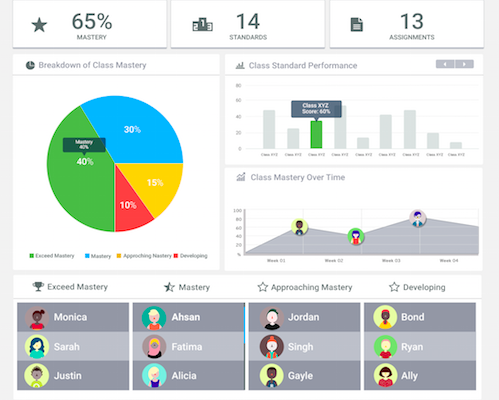The 5 Components of Assessment Strategies

In 2009 leaders from every state came together to launch an effort to identify college and career readiness goals for high school students, and to address expectations for kindergarten through 8th-grade instruction. This became known as the Common Core Objectives, which should be the objective knowledge goals that we as instructors strive to teach.
But, how can you successfully and consistently measure mastery of these objectives for your particular subject area? Five components are critical to achieving assessment that positively influences learning outcomes:
Component 1
Formulate and communicate goals: Students learn more effectively when goals and learning expectations are clear. As a teacher, you must have a clear picture of what achievement your assessment intends to measure and communicate that to your students.
- What facts and concepts do you want your students to know?
- How would you like for them to use this knowledge in application to a problem to solve?
- What skill do you want them to demonstrate using the knowledge they have learned?
- Do you want them to create something, a project or demonstration, to show mastery?
Component 2
Select a correct assessment: Students should, if possible, have a choice of ways to demonstrate mastery. There are generally four ways that students can be assessed: knowledge mastery, proficiency, skill demonstration, and product creation.
As the teacher, it is up to you to choose the most appropriate assessment for the subject matter, but within the evaluation should be choices. For instance, if you decide that verbal assessment is the best way to evaluate mastery, you might offer a dramatic reading, a speech, or a demonstration.
Component 3
Create experiences that allow for different learning modes: Presentations, projects, and written papers demonstrate mastery, but so does building a model of a molecule. A presentation might mean recording a podcast or a YouTube video, illustrating a short book or a physical model of a concept. Whatever the assessment, it should align directly with the learning goals that you communicated to the students.
Component 4
Use feedback and assessment to improve learning: Communicate clearly at the beginning of the instruction what the planned feedback points are for the information to be learned. These will be times when you sit down with the student and give feedback based on the assignment segments.
For instance, If the project will be written, three feedback points might be:
- The outline
- The rough draft
- Peer critique of the pre-final paper
The point of the planned feedback is to provide specific direction such as “I can see that you intended to prove your point using multiple facts, but choose the most important three and focus on those.”
Component 5
Assessment should include choices: Choose some direct methods of assessment and some indirect, too. Seek feedback from the students on what type of assessment choices they want and work to incorporate those if you can.
Direct methods: Case study examination, essay test question, portfolio, performance
Indirect methods: Focus group, survey, discussion.
Effective use of formative assessments, individual assessments (tests), and ongoing assessment by you, the teacher, can combine to bring a cohesive picture of what your students are mastering.






